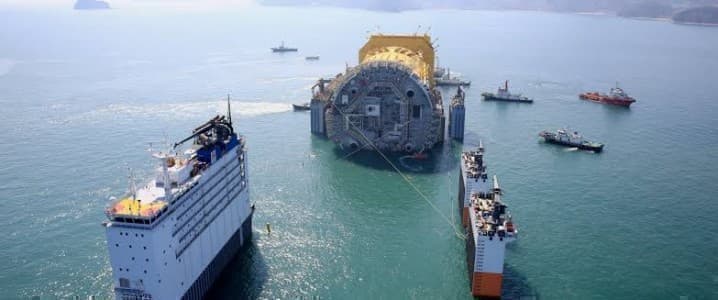The UK’s North Sea oil and gas industry and its supply chain were hit hard by the oil price crash and coronavirus pandemic, leading to deferred projects and non-essential maintenance on offshore platforms as operators cut costs and limit offshore personnel deployment. The current crisis—which came just as the UK offshore sector had started to recover from the previous price crash in 2014—has made future plans increasingly uncertain.
Analysts are not sounding the death knell for the UK North Sea industry yet. Experts and the industry itself believe it can survive in the short term and position itself for playing a role in the energy transition by adapting to a greener future with diversification into non-oil and gas energy projects.
But challenges remain, both for the short term and the longer term, as the current crisis has made decision-making for the future quite difficult.
“Unlocking further opportunities that are not already in company business plan will take time,” according to OGUK, the leading representative body for the UK’s offshore oil and gas industry.
“Deferred opportunities may need to compete with projects already earmarked for 2021. It may take two to three years to catch up,” OGUK operations director Katy Heidenreich said on a recent OGUK Road to Recovery webinar, as carried by Energy Voice.
In addition to a wave of deferrals of planned projects, the visibility on the exploration and production (E&P) companies’ future drilling plans remains very low, Heidenreich said, as many operators are still assessing the impact of the double whammy of the COVID-19/oil price collapse on their medium-term plans.
In the near term, the North Sea industry can survive, Neivan Boroujerdi, principal analyst in Wood Mackenzie’s North Sea upstream team, said in March after prices collapsed. Nearly all, or 95 percent, of the ongoing oil production in the North Sea is “in the money” at $30 a barrel oil, Boroujerdi noted.
Going forward, there isn’t a guarantee that costs will further fall, so E&P operators will have to review their plans for field development to materially cut costs, WoodMac’s analyst said.
Related: Where Will The World’s Next Giant Gold Discovery Be Made?
“For the companies that survive, they will need to adapt to a greener future,” Boroujerdi said.
The immediate impact of the crisis led to rig contract cancellations and deferral of final investment decisions (FIDs) offshore the UK. As of end-June, eight rig contracts were canceled, four FIDs were delayed, and only seven exploration wells were expected to be drilled this year, down from 32 in 2019, Rystad Energy said in June.
In August, China’s CNOOC, the operator of the Buzzard oilfield offshore the UK, postponed the start-up of Buzzard Phase II from this year to 2021, due to the challenging price environment.
Project deferrals are immediately filtering through the UK supply chain and oilfield services contractors.
Earlier this year, the OGUK industry body said in its Business Outlook that it was “particularly concerned about the ability of the supply chain to absorb more pain. Contracts are already being deferred or cancelled and the longer-term pipeline of work is becoming increasingly uncertain.”
There will be short-term pain in the services sector as upstream operators consider plans for UK North Sea investments, which inevitably leads to job losses. OGUK estimated in April that up to 30,000 jobs could be lost over the next 12–18 months, “if action to help the sector weather this storm is not successful.”
At a hearing at the Scottish Affairs Committee, OGUK chief executive Deirdre Michie said in early July that since the crisis began, as many as 7,500 jobs in the industry had been made redundant and more redundancies could be coming if activity does not pick up.
Many companies in the UK supply chain have started to diversify their revenues to generate more business from non-oil and gas related work, says OGUK, which believes that the UK’s net-zero ambition is a great opportunity for the future of the offshore services industry.
“More than three-quarters of supply chain companies expected to increase their exposure to non-oil and gas work this year, and the proportion is likely to have increased even further in light of recent trends,” OGUK said in April.
ADVERTISEMENT
Offshore wind, carbon capture and storage (CCS), hydrogen, and marine & wave energy could be the next revenue-generating streams for the industry.
As OGUK’s Heidenreich said in May:
“We know that we can’t wait around for a recovery to come to us, which is why we’re already in action to understand where we can support supply chain companies and identify fresh opportunities in a challenging low oil and gas price environment.”
By Tsvetana Paraskova for Oilprice.com
More Top Reads From Oilprice.com:
- Is Argentina’s Shale Too Expensive To Drill?
- 3 Energy Stocks To Consider Even As Markets Remain Stagnant
- U.S. Pushes Iraq To Cut Energy Dependence On Iran



















Today, oil prices are hovering around $43-$46 a barrel. While most of the the UK’s North Sea oil and gas producing projects will survive such price levels, many projects will be destined for deferral. It may take 2-3 years before prices rise to levels to make the deferred projects economical again.
Dr Mamdouh G Salameh
International Oil Economist
Visiting Professor of Energy Economics at ESCP Europe Business School, London